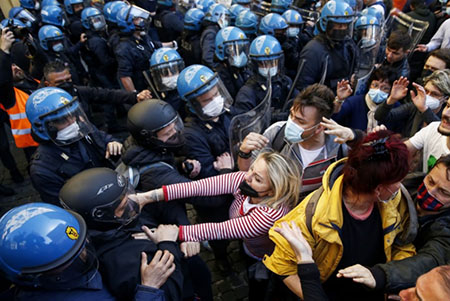by WorldTribune Staff, April 14, 2021
“Libertà, Libertà,” chanted protesters calling for an immediate end to Rome’s strict Covid-19 lockdown measures.

In recent weeks, large scale anti-lockdown demonstrations have mounted in Austria, Great Britain, Finland, Romania, Switzerland, Poland, France, Bulgaria, Serbia, the Netherlands, and Romania, VOA News reported on April 9.
“We can no longer go on like this,” 51-year-old pizzeria owner Ermes Ferrari told reporters. “I just want to work.”
“I had to spend €10,000 to adapt the pizzeria so that it was in accord with virus safety precautions, then the government made us close down. It’s shameful. I have no more money left. My employees don’t have money to eat,” Ferrari told the Corriere della Sera newspaper.
Many protesters have said they are worried about reclaiming basic freedoms, fearing governments may be less willing to relinquish powers they have accrued to themselves during the pandemic, the report said.
“Ensuring that the powers the government has granted itself are abolished rather than kept for a future occasion is going to be hard political work. As is ensuring that we set the bar very high for renewing such powers in the future,” Daniel Finkelstein, a former Downing Street adviser, wrote in an op-ed for The Times of London.
UK Conservative lawmaker Steven Baker said he plans to vote against an extension of Covid emergency powers to September, saying his vote “will present a rare opportunity for members of parliament to say no to a new way of life in a checkpoint society, under extreme police powers, that we would not have recognized at the beginning of last year.”
Amnesty Intern

ational says some lockdown measures have aggravated existing patterns of abuses and inequalities in Europe and Central Asia, where a number of governments used the pandemic “as a smokescreen for power grabs, clampdowns on freedoms, and a pretext to ignore human rights obligations.”
Government responses to Covid-19 “exposed the human cost of social exclusion, inequality, and state overreach,” the London-based watchdog said in its annual report released on April 7.
Law enforcement officials unlawfully used force along with other violations in Belgium, France, Georgia, Greece, Italy, Kazakhstan, Kyrgyzstan, Poland, Romania, and Spain, the Amnesty International report said.
In Azerbaijan, arrests on politically motivated charges intensified “under the pretext” of containing the pandemic.
Authorities in Kazakhstan and Uzbekistan adopted or proposed new restrictive laws on assembly.
Belarusian police responded to mass protests triggered by allegations of election fraud with “massive and unprecedented violence, torture, and other ill-treatment.”
“Independent voices were brutally suppressed as arbitrary arrests, politically motivated prosecutions, and other reprisals escalated against opposition candidates and their supporters, political and civil society activists, and independent media,” the report said.
Governments in Armenia, Azerbaijan, Belarus, Bosnia-Herzegovina, France, Hungary, Kazakhstan, Poland, Romania, Russia, Serbia, Tajikistan, Turkey, Turkmenistan, and Uzbekistan “misused existing and new legislation to curtail freedom of expression.”
Governments also took insufficient measures to protect journalists and whistleblowers, including health workers, and sometimes targeted those who criticized government responses to the pandemic. This was the case in Albania, Armenia, Belarus, Bosnia, Hungary, Kazakhstan, Kosovo, Poland, Russia, Serbia, Turkey, Ukraine, and Uzbekistan, the report said.
In Tajikistan and Turkmenistan, medical workers “did not dare speak out against already egregious freedom-of-expression restrictions.”
Anti-lockdown demonstrations in Romania took place in the capital Bucharest as well as in Cluj-Napoca, Sibiu, Constanta, and several other cities. The demonstrations were mainly organized by the AUR Party. (See Radio Free Europe/Radio Liberty’s photo gallery of the protests here.)
INFORMATION WORLD WAR: How We Win . . . . Executive Intelligence Brief
